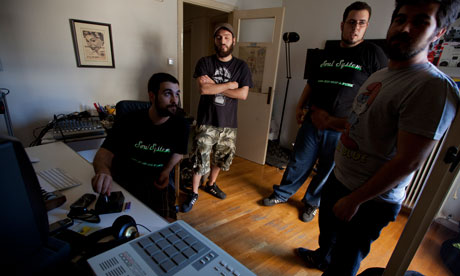Το παρακάτω άρθρο δημοσιεύτηκε στην στην αγγλική εφημερίδα Guardian από τον δημοσιογράφο (στην Αθήνα) Peter Beaumont, σαν αφιέρωμα στο ελληνικό ραπ συγκρότημα με πολιτικοκοινωνικό στίχο Soul System, στο πλαίσιο της ελληνικής κρίσης. Στο εν λόγω δημοσίευμα, ο δημοσιογράφος, αναφέρεται ειδικά στον Μίκη Θεοδωράκη και στη συγκέντρωση των Προπυλαίων του Πανεπιστημίου Αθηνών τον περασμένο Μάιο, σημειώνοντας χαρακτηριστικά (ελεύθερη μετάφραση από εμένα! Παρακάτω, στο κείμενο, με κόκκινα έντονα γράμματα διακρίνετε το πρωτότυπο):
"Ελάχιστοι από τη παλαιά γενιά έχουν βγει μπροστά να μιλήσουν' Ιδιαίτερα ένας από τους πιο γνωστούς συνθέτες της Ελλάδας, ο Μίκης Θεοδωράκης, ο 86χρονος πιο γνωστός για το "Ζορμπάς ο Έλληνας". Τον Μάιο, παρευρέθηκε σε διαδήλωση 20,000 ατόμων για να σχολιάσει το μνημόνιο για την ελληνική οικονομία ως "εθνική προδοσία".
Ο Μίκης Θεοδωράκης, ο "παντοτινός έφηβος", στα 86 του χρόνια, έχοντας υψώσει -ο ΜΟΝΟΣ εκ των καλλιτεχνών- το ανάστημά του μπροστά σε ακόμη μία χούντα για τη πατρίδα μας, είναι αυτός που το όνομά του αναφέρεται πλάι σε νεότατους καλλιτέχνες με πολιτικές ανησυχίες, εν έτει 2011...
Ο Μίκης της Ελλάδας μας, ο Μίκης της Οικουμένης, ο Μίκης των νέων και της μαχητικής νεολαίας!
Χρήστος Σωτηρόπουλος
Εκπρόσωπος ΣΠΙΘΑ ΜΑΡΚΟΠΟΥΛΟΥ
--------------------------------------------------------------------------------------------
(Αναδημοσίευση από Guardian.co.uk)
Greek debt activists move to a hip-hop soundtrack
Athens group Soul System and rapper BD Foxmoor are at the forefront of the musical protest movement
- guardian.co.uk,
 |
| Rap group Soul System in Athens, Greece. Photograph: Sean Smith for the Guardian |
If you look for evidence of Greece's present discontent within its popular culture you will not find it in the huge posters advertising big-name singers and nightclubs plastered all over the capital. The musicians singing about Greece's political, financial, social and even cultural crisis are not the ones you'll see on Greek television. Instead, if you want a flavour of the songs that have come to define the protest movement, you need to head to one of the demonstrations proliferating across the country, where you might find the hip-hop group Soul System. A combination of two previous bands, Soul Nek and Dagobah System, Soul System is a group of friends in their mid-twenties.
At their studio in a modest Athens house they play videos of their performances. In one they attack those working for political parties for selling out the dreams of Greeks. In another they encourage fans to "keep fighting". "They can put you in jail," one lyric goes, a reference to the increasingly fraught confrontations between young demonstrators and police, "but not your dreams and hopes."
Agglos Kloukas, 27, explains their philosophy. "We try to sing about the way we live in Greece today – about racism and everyday life. About the social issues people are facing," he says. "The crisis has helped protest music and more political lyrics come more into the main stream," adds
Manos Zahariadis, 26. It is a change, they believe, in a culture where for too long people have been content to ignore those describing Greece's mounting problems. "People have stopped just staying in and watching television and have gone out on the streets. They are talking about different things," says Achileas Tosikean.
"We've all been going to the demonstrations." Still, he is disappointed with the reactions, even on the streets. "Half the people are coming out to demonstrate while half just choose to stay in at home. But, even among those who do come out to demonstrate, a lot still don't know what they are shouting so angrily about."
There has long been protest music in Greece – this is, after all, the country that produced the underground sound of rembetika at the turn of the century, which flourished again after the coup in 1967 – but, until recently, it only reached a small audience. Now, say Soul System, protest music is set to go mainstream. As a result of their activism – with performances that include video from television debates dealing with the crisis – they have been invited to perform at rallies and marches.
The group see the crisis as an "economic war" that threatens not simply Greece but has "universal" implications. And, in the short term at least, some are not exactly optimistic. In the midst of all Greece's problems, says Tosikean, many are still more interested in entertainment than understanding what is going on around them. "Bad entertainment," adds Zahariadis.
If Soul System are overtly political, Greece's most famous rapper, Michalis Mitakidis, aka BD Foxmoor, of hip-hop band Active Member, is critical of the Greek music scene as a whole for not engaging with his country's problems. Talking in his home and recording studio in the shipyard town of Perama, one of the areas worst hit by unemployment, Mitakidis is critical of those who won't stand up against the corruption that has long bedevilled the country. "People have accepted what has been going on in Greece, our [political] regime for 20 years. When you spoke out against it you were regarded as a kind of lunatic. Now people are seeing things for the first time," he says. "I think why people are shocked is that they were all expecting this to happen but they were still hoping that it wouldn't." If Mitakidis believes that Greece was trapped in a "dream", he blames some artists of his generation for being co-opted into a conspiracy of silence.
A select few of the older generation have spoken out, not least one of Greece's most famous composers, Mikis Theodorakis, the 86-year old best known for Zorba the Greek. In May he joined a rally of 20,000 people to criticise the bailout deal for Greek's economy as a "national betrayal".
For Mitakidis, however, the problem goes deeper. "People did not want to see anything except the things that made them believe that their lives were being lived better," he says. 

Ευχαριστούμε τη Σπίθα Μαρκοπούλου!
ΑπάντησηΔιαγραφήMary K.